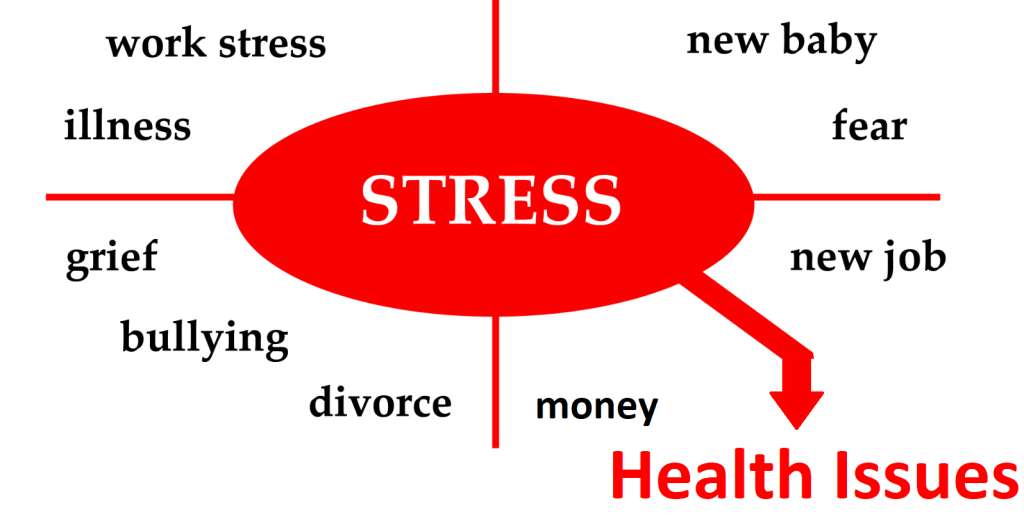The number of health issues caused by stress is numerous, but when we allow that stress to become chronic, it can lead to serious health issues, affecting both physical and mental well-being. Some health problems related to stress include:
- Mental health problems like depression, anxiety, and personality disorders.
- Cardiovascular diseases such as heart disease, high blood pressure, heart attacks, and strokes.
- Obesity and eating disorders.
- Gastrointestinal problems like GERD, gastritis, ulcerative colitis, and irritable colon.
- Skin and hair problems include acne, psoriasis, eczema, and loss.
- Sexual dysfunction in both men and women.
- Alzheimer’s disease progression.
- It accelerated aging effects.
- Increased risk of premature death.
These health issues emphasize managing stress effectively to maintain overall health and well-being.

How To Manage Stress To Prevent Health Problems
To manage health issues caused by stress effectively and prevent them from becoming problems, it is essential to adopt healthy coping strategies. Here are some key tips based on the provided sources:
- Exercise Regularly: Physical activity like brisk walks or jogging can help relax your body and mind, improving your mood.
- Relax Your Muscles: Techniques like stretching, massage, hot baths, and good sleep can help loosen tense muscles and refresh your body.
- Practice Deep Breathing: Taking deep breaths for 5 to 10 minutes can alleviate immediate pressure and improve well-being.
- Eat Well: Maintaining a balanced diet rich in vegetables, fruits, whole grains, and lean protein can enhance mood and energy levels and reduce stress.
- Slow Down: Finding ways to slow down daily, like setting realistic goals and breaking tasks into smaller ones, can help reduce stress levels.
- Take Breaks: Plan downtime to rest your mind from stress, even if it may initially be challenging for goal-oriented individuals.
- Maintain Physical Exercise and Good Nutrition: Regular exercise and proper nutrition are crucial in stress management and overall well-being.
- Manage Social Media Time: Limiting social media use and engaging in activities that promote relaxation can reduce stress levels and improve sleep quality.
- Connect with Others: Building supportive relationships through community involvement or shared activities can provide emotional support during stressful times.
- Get Plenty of Sleep: Restful sleep is vital for managing stress, as sleeping problems are common when under stress.
By incorporating these strategies into your daily routine, you can effectively manage stress, reduce its impact on your health, and promote overall well-being.
How To Manage Stress In The Workplace
Managing stress in the workplace is crucial for maintaining overall well-being and productivity. Here are some effective strategies based on the provided sources:
- Time Management: Prioritize tasks, create to-do lists, and allocate time for interruptions to manage workload effectively and reduce stress.
- Take Breaks: Incorporate hourly mini-breaks to stretch and relax your muscles, providing physical stress relief that can reduce mental stress.
- Exercise: Engage in regular physical activity, such as running, swimming, brisk walking, yoga, or stretching, to reduce stress and promote a calmer state of mind.
- Communication: Discuss work-related stress with family or friends to explore solutions and coping mechanisms.
- Self-Care: Ensure you take lunch breaks and avoid skipping meals, as this can contribute to increased stress levels.
- Realistic Expectations: Avoid overcommitting and learn to decline additional tasks beyond your capacity to handle effectively and politely.
- Relaxation Techniques: To calm the mind and alleviate stress, practice meditation, mindfulness, deep breathing exercises, or grounding techniques.
- Create a Comfortable Work Environment: Establish a workspace that promotes comfort and productivity to reduce unnecessary stressors.
- Understand Expectations: Clarify job expectations and responsibilities to avoid misunderstandings that can lead to stress at work.
By implementing these strategies, individuals can effectively manage workplace stress, enhance their well-being, and maintain a healthy work-life balance.
How To Set Boundaries Between Work And Personal Life To Reduce Stress
To set boundaries between work and personal life effectively and reduce stress, consider the following strategies based on the provided sources:
- Define Your Working Hours: Establish clear start and end times for your workday to prevent overworking and maintain a healthy balance.
- Create Separate Workspaces: Set up a dedicated workspace at home to differentiate between work hours and personal time. This will help you focus during work hours and disconnect afterwards.
- Take Regular Breaks: Incorporate short breaks throughout the day to stretch, move around, and recharge, which can improve productivity and reduce stress levels.
- Prioritize Self-Care: Make time for relaxation, hobbies, exercise, adequate sleep, and healthy eating outside of work to boost energy levels and well-being.
- Communicate Your Boundaries: Communicate your boundaries with colleagues, friends, and family regarding your working hours and availability to prevent work from encroaching on personal time.
- Use Assertive Communication: Employ assertive communication with supervisors to set boundaries on workload and expectations, ensuring that your needs are met for a healthy work-life balance.
- Set Mental Boundaries: Limit work-related thinking outside work hours to preserve mental energy and prevent work from dominating personal life.
- Establish Physical Boundaries: Communicate guidelines for physical interaction at work to create a comfortable environment that separates work from home life.
- Create Emotional Boundaries: Understand how work affects your emotions, protect your emotional energy, communicate feedback preferences, limit interactions with toxic coworkers, and take mental health days as needed.
By consistently implementing these strategies, individuals can effectively set boundaries between work and personal life, reduce stress levels, enhance well-being, and maintain a healthier work-life balance.
